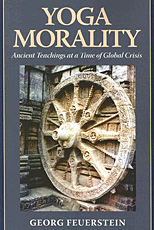Georg Feuerstein is the author of more than 30 books and an educator who offers distance-learning courses on Yoga philosophy and history. In his preface to this excellent resource, he notes the enormity and breadth of the problems we face in the twenty-first century. He agrees with Albert Einstein who once observed:
"The most important human endeavor is the striving for morality in our actions. Our inner balance and even our very existence depend on it. Only morality in our actions can give beauty and dignity to life."
Feuerstein's goal here is to "outline the moral teachings of Yoga as an integral aspect of Yoga's program of spiritual self-transformation." The cultivation of virtue is a noble path that honors the interdependence of all beings and things and leads to wisdom and service of others. The author does a fine job assessing the five key virtues which are acknowledged by Hinduism, Buddhism, and Jainism: nonharming, truthfulness, nonstealing, nongrasping (greedlessness) and chastity.
It is commendable to practice nonharming in action, thought, and word, and so we ask ourselves whether what we do for a living involves harming others in ways that are not morally justifiable, such as spreading gossip, competitiveness, our food habits, our consumer choices. Feuerstein looks at truthfulness and sees it at an all-time low in politics, the corporate world (including advertising and marketing), and the media. In his discussion of nonstealing, the author includes the problems of gambling, debt, inordinate wealth, identity theft, hacking, racketeering, and fraud.
Theologian and novelist Andrew Greeley has called greed "America's disease." Antidotes to this way of life include voluntary simplicity and radical nonattachment. Feuerstein sees compassion and love as a 24-7 attitude, which embraces all beings. He concludes with a discussion of some miscellaneous yogic virtues that we possess "whenever self-centeredness has been suspended and the mind's characteristic turmoil has been properly pacified."
